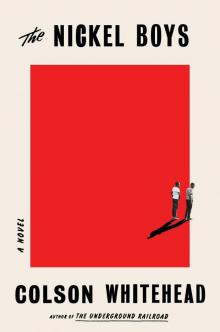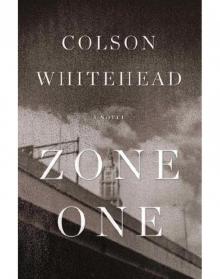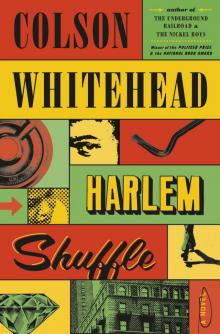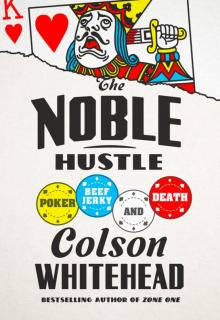- Home
- Colson Whitehead
Zone One Page 4
Zone One Read online
Page 4
Buffalo, he explained, wanted information on the general outline of each engagement, but in particular they were keen for the sweepers to record demographic data: the ages of the targets, the density at the specific location, structure type, number of floors. Fabio, the Lieutenant’s second, had rummaged Canal Street after special equipment for this very purpose. Fabio handed his boss the carton of kiddie notebooks, and the Lieutenant brandished it over his head, pointing out that they were equipped with convenient loops that held tiny pencils. The plastic-covered notebooks were candy-colored and palm-size, brimming with the characters and arcana of a prosperous and long-standing children’s entertainment combine. The creation myth of the product line concerned the adventures of a clever, effeminate armadillo and his cohort of resourceful desert critters. Although the parent company was one of reconstruction’s first official sponsors, until now Buffalo had found little use for their tie-in merchandise, apart from the well-branded adhesive bandages. “Doubtless you will appreciate this example of superior Japanese engineering,” the Lieutenant said, sliding the pencil back and forth.
The sweepers groaned and dislodged belches redolent of the mysterious Far East beverage, smudging the air with ginger. The Lieutenant tendered his regrets over the hassle, in his custom. The Lieutenant preferred a light touch, ditching protocol when it served his purposes. Casting himself as the hip young teacher in the high school was part of his strategy for keeping them alive, Mark Spitz theorized. The Lieutenant’s sweepers were a nontraditional brigade to say the least, volunteers from civilian pop. and untutored in the routine malevolence of military code. The training courses and drills of their boot camp had been the split-second decisions and pure, indifferent chance that had permitted them to survive to this moment. (Although it should be added that most of them had received a crash course in basic gun use since the advent of the plague.) Soldiers of the new circumstance. What did it serve to hold them to strict military standards when they were such an unlikely lot: unemployable man-children, erstwhile cheerleaders, salesmen of luxury boats, gym teachers, food bloggers, patent clerks, cafeteria lunch ladies, dispatchers from international delivery companies. People like Mark Spitz, seemingly unsnuffable human cockroaches protected by carapaces of good luck. The Lieutenant’s first priority was keeping their limbs and assorted parts attached to their bodies, free of teeth; then came the trickled-down objectives; and, finally, servitude to the obsolete directives of an obsolete world.
The Lieutenant’s casual attitude was facilitated by the fact that the sweepers’ primary targets were stragglers. Compared to what the marines encountered in Manhattan during that initial, mammoth sweep, those assembled in the dumpling joint had it easy. Mark Spitz wouldn’t have signed up for the island had it been otherwise, New York homesickness or no.
“Buffalo, as ever, has great plans for you guys,” the Lieutenant said. He tossed the box of notebooks to the mule-eyed hulk slouching at the closest table, a man who went by the handle of the Professor, an appellation that contradicted his dumbfounded mien. He’d been a mate on a sport-fishing boat in sunnier times, steering rum-addled vacationers to schools of snapper via sonar. The Lieutenant motioned for him to pass the box around. “I know what you’re going to say—we need boots and they talk to us about numbers.”
Actually they had boots, and most of the sweepers had raided sneaker stores for more comfortable designer footwear after a round of death marches up high-rise stairwells; fortunately for them, the sneaker sponsor had manufactured several product lines for different ages, aesthetic appetites, and athletic inclinations. It was comforting, in the recesses of buildings, to see your buddy’s heel blink from the tiny red LEDs in a novelty running shoe, although Mark Spitz did not partake because of the obvious ankle-exposure issue. Boots was the Lieutenant’s catchall term for truly clutch materiel, the elusive, the vital. Mark Spitz heard the others shifting in boredom at the reference. What did boots symbolize for the man? Order. Sturdy rules. His trove of bygones. All survivors had them, the pet names and metonyms they used to refer to their pasts. Bagel, java, baseball cap, the object that was all objects, the furnishings of the good old days. Why couldn’t the Lieutenant maintain his shrine? Everyone else did.
Mark Spitz flipped through the pad. Faint pink-and-purple cacti sprouted in the margins. He recognized the sense of Buffalo’s plan. With the assembled data, their supply of eggheads could start projecting how many of the dead they’d find in your typical twenty-two-story corporate flagship, five-floor tenement, fifteen-story apartment complex, what have you. Every structure sheltered its likely trajectories and scenarios; they’d figured that out early. Take residential buildings, for example. Walk into one of the wizened tenements of downtown Manhattan and you could bet on finding at least one citizen who’d barricaded himself inside, turned, and then couldn’t get out. In the first wave, people got infected, barely making it home ahead of collapse. Then the plague wiped and reformatted their brains and they were trapped in their abodes, the most pathetic kind of city shut-in, their hands eventually groping their way toward expensive security locks but incapable of reaching them for the passel of splendid contemporary furniture they’d piled against it. Mark Spitz cursed his luck when he realized they were going to have to remove the door and get all that shit out of the way before they could put the skel down: the particle-board media centers laden with layaway plasmas, limited-issue replicas of Danish-modern wardrobes, the beloved go-to recliners grimed at the armrests from summers of sweat. These specimens were your average skels, not harmless stragglers but a reliable if small percentage of what you’d find in Zone One, so you had to stay frosty.
By now, Mark Spitz could look at a building and know what kind of weather was brewing inside. Office towers were the least populated. The nine-to-fivers had stopped coming to work when it went down, and most of the rabid skels were lured out by the marines, which left stragglers. (Perhaps, he thought, there will be a study of the farthest a straggler had traveled to its haunting grounds—across streams! quicksand! perilous canyons!—but that was far in the future.) A building like 135 Duane, with its panoply of enterprises, had its idiosyncrasies but nonetheless conformed to the prevailing narrative. Department stores, multinational coffee chains, half-constructed condos. Churches and banh mi shops. Although every address, every new chunk of the grid assigned to them, contributed its special embroideries, the story never changed.
2.4 stragglers per floor in this type of structure and .05 there. Numbers permitted Buffalo to extrapolate the whole city from Zone One, speculate about how long it will take X amount of three-man sweeper units to clear the island zone by zone, north to south and river to river. Then on to other cities. There was no other entity like New York City, but the silent downtowns bided across the country with their micropopulations, acolytes of the principles of the grid. The truths of the grid’s rectilinear logic, its consequences, of how people moved and lived inside boundaries, had already been applied to cities across the country through the decades, anywhere human activity and desire needed to be tamed and made compliant. Gangs of high-rises in Southwest municipalities flush with internet money, sterile pedestrian malls in Midwest cities of a certain size, run-down waterfront districts of fabricated historical import that had been tarted up into tourist mills. Sure, there was the problem of scale, but Manhattan was the biggest version of everywhere.
The city bragged of an endless unraveling, a grid without limit; of course it was bound and stymied by rivers, curtailed by geographical circumstance. It could be subdued and understood. Soon sweeper teams would roam the rural areas on an identical mission to that of the metro sweepers, concocting the equations of the countryside, putting numbers to nascent theories about skel dispersal patterns, and in time these numbers would deliver end dates and progress and the return to life before. As he sat in the restaurant, Mark Spitz pictured the Lieutenant’s box of tiny notebooks, overflowing with half-legible sweeper scribbling, being off-loaded from a military helicopter
upstate and rushed by a harried private into an underground chamber at Buffalo HQ. Like it was someone’s liver being delicately transported to the waning recipient. He’d never been to Buffalo, and now it was the exalted foundry of the future. The Nile, the Cradle of Reconstruction. All the best and brightest (and, most important, still breathing) had been flown up to Buffalo, where they got the best grub, reveled in 24-7 generators and uncurtailed hot showers on command. In turn, they had to rewind catastrophe. Rumor was they had two of the last Nobel laureates working on things up there—useful ones, none of that Peace Prize or Literature stuff—chowing down on hearty brain-fortifying grub, scavenged fish oil and whatnot. If they could reboot Manhattan, why not the entire country? These were the contours of the new optimism.
After describing the kind of data that Buffalo expected of them and shooing questions of various pertinence (“No, Josh, we don’t need their weight unless it is something truly spectacular,” “Home addresses? What are you going to do, forward their mail?”), the Lieutenant shifted to his favorite pastime, the delivery of the Nightly News. He held that morning’s feed to the light. It was all positive, in line with the trend of late. To wit: “Organic-food fans will rejoice that Happy Acres claims this year will bring their biggest harvest yet—”
Grateful noises filled the dumpling house, for who among them could forget the return of fresh corn last year? Never in human history had so many delighted in removing a bit of kernel from between canines and bicuspids. Mark Spitz stumbled upon the Happy Acres crops his first night in camp. He’d ditched the mess hall for some air, dizzy from the laughter of the army guys and the other new recruits. It was in those dwindling days before the looting regs went into effect and scavenger crews had routed a den of bandits who had taken over one of the mega-drugstores. Half the bandits died in the gunfight and the other half eagerly took oaths of loyalty to the provisional government upon surrender. They returned with three trucks’ worth of medicine. Needless to say everyone took their cut, filling their utility vests and packs with booty, the favorite anti-tartar toothpaste and allergy tablets, travel size if possible. These products had kept them running in the old world, if only by placebo effect. The soldiers availed.
After they finished trading glory stories over their personal hauls, the conversation turned to speculation about the cigarette-salvage possibilities of Manhattan. A lot of people had taken up smoking lately. News of a potential NYC operation was starting to get out, and that morning’s couriers from Buffalo disseminated gossip about the latest operation down South, a hydroelectric plant brought online. Then one of the snipers—Gibson was his name—told a story about a skel bonfire gone awry, which broke everybody up. The skel on top had been neutralized, but a chunk of his brain was still sending orders, apparently. The fire activated the creature so that it looked like the skel was “break dancing” in the flames. Mark Spitz had been laughing with the rest of them, more on account of Gibson’s deadpan delivery than the anecdote, when his head was suddenly encased in lead and his vision went on the fritz. It was as if he’d been hit on the head with a pipe—he’d actually been hit in the head with a lead pipe in college, when a gang of townies had invaded the Spring Concert looking for trouble. In retrospect, this drowning sensation was the first indication that something started to go wrong with him when he came in from the wasteland.
He needed air. Mark Spitz ducked through the plastic tent flaps and lost himself in the rows of cabins, staggering between the red-and-yellow nylon tents containing the new arrivals who were also spending their first night at Happy Acres. He sensed them stiffening at his slow footfalls, which made him sound like one of the dead. They poked a head out, then calmed themselves and withdrew. He wandered toward the line of sodium lights at the far edge of camp. There they were, behind the fence, lit up, regimented, droopy with promise: the holy stalks, up to his chest and disappearing into the darkness. He’d been eating three squares a day, listening to actual jokes, seeing whole ragamuffin gangs of kids—when was the last time he saw more than one kid at a time? And now, fresh corn. The miracles turned routine. They pushed up like weeds.
“Back away from the fucking corn, dude.” The two guards pointed their weapons at his head, at two of the five recommended skel-dropping points. The sentries couldn’t have been older than sixteen. He didn’t begrudge them their duty. The crops were important. The crops separated today’s iteration of humanity from last year’s. He waved the rifles away and gaped. It was funny: up against the gate, shivering in the slight wind, they were almost an army of skels approaching the camp’s delicious signs of human life. Half the stuff was probably going to Buffalo, but that didn’t matter. It was still a wonder. Mark Spitz backed away from the fucking corn.
The Lieutenant said, “And again, please ignore the scuttlebutt about what they use for fertilizer. What else, my young friends, what else? Supposedly the new incinerator is going run double our capacity, so you know what that means—”
“Ash Wednesday!” yelled someone in the back.
“And Thursday and Friday.” The Lieutenant consulted the feed and informed them that a senior board member of that juggernaut clothing empire had turned up at Victory’s Sword and magnanimously pledged his company’s goods to the effort. The Lieutenant allowed his troops a minute, and then told them to simmer down. It would be difficult to describe their enthusiasm as unwarranted. The company cultivated four product lines: an upscale boutique providing sophisticated apparel fit for a day at the office or an evening out on the town; a mass-market suite of sensible, everyday basics; modestly priced designs for the cost-conscious consumer; and a recently acquired purveyor of plus-size lingerie that had fallen on hard times but had been turned around by the smart management of their new parent company. All the clothes were well crafted regardless of their price point; the company kept abreast of the latest fronts in cheap child labor. “The entire corporate family is open for business,” the Lieutenant said, “for any item with a retail price of under thirty dollars. Check the price tags, fellas! If you need new skivvies or a sweatshirt or something.”
“Can’t get no sweatshirt under thirty dollars!”
Someone in the back, at one of the undesirable tables by the toilets, countered that it was easy enough to acquire a sweatshirt for less than that sum at the bargain store. Another seconded this assertion.
“Gary’s getting some big-lady teddies,” yelled one of Gary’s old cronies.
“We think it feels good under the mesh—you should try it,” Gary said, baring his gray teeth in a line. Everyone who worked with Gary quickly adjusted to the man’s habit of referring to himself with the first-person plural. He was a triplet, one of three brothers. The other two perished on Last Night, but Gary continued to speak for their collective, maintaining what Mark Spitz assumed was a lifelong practice of presenting a united fraternal front to all who did not share their precise genetic makeup. It was a disturbing vision, Gary and his other versions standing in their mobile home’s kitchen demanding sweets or more cartoons, much more disturbing than hearing a man in combat fatigues relate the enthusiasms of ghosts. PASD had as many faces as there were uninfected, and, as was the case with the Wasteland Starers, you took someone else’s particular symptoms as harmless foibles. Simple courtesy, lest they take objection to yours.
Mark Spitz resolved to pick up some new socks. Now that the anti-looting regs were in effect, everyone—soldier and civilian and sweeper alike—was prohibited from foraging goods and materials belonging to anyone other than an official sponsor, whether it was Southern whiskey or all-natural depilatories. Food was exempt—juice boxes were still legal tender in some parts of the country—but for the most part, no more stealing, people. There had been laws once; to abide by their faint murmuring, despite the interregnum, was to believe in their return. To believe in reconstruction.
The prohibitions were hard to enforce, however, for obvious reasons. The civilians in the camps could be policed, as most never left the perimeter, but
untold Americans still walked the great out there, beyond order’s embrace, like slaves who didn’t know they’d been emancipated. The sanctioned salvage teams were largely unsupervised and the soldiers had personal needs that escaped the classifications on requisition forms, did not have ID numbers. Officers confiscated contraband when it was flaunted in their faces—designer sunglasses and the robust leathers favored by motorcycle fans of both serious and dilettante persuasion—but they had better things to do than babysit. Kaitlyn, in deference to the hall-monitor part of her disposition, kept watch on the two men under her supervision, Gary especially, and for good reason. He’d been a master bandit before the rise of the camps and, in addition, rather enjoyed Kaitlyn’s shrill intonation when she used her discipline voice.
Buffalo created an entire division dedicated to pursuing official sponsors whenever a representative turned up, in exchange for tax breaks once the reaper laid down his scythe and things were up and running again. (Additional goodies the public would never find out about weeviled the fine print.) There were understandable difficulties in tracking down survivors in positions of authority over, say, the biggest national pharmaceutical chain or bicycle manufacturer, but they strolled into camp from time to time, with the typical scars but eager to contribute. They generally put a price cap on their goods or specified a particular product in their brand family, one not too dear, but their sacrifices were appreciated nonetheless. Pledge all your tiny cartons of children’s applesauce, in all the nation’s far-flung groceries and convenience stores? It was a no-brainer: they were expired anyway. The civilians out in the wild, unaware of the regulations, would be welcomed into the system in time, and they would obey.
Socks. Yes, socks. The prospect of a nice new three-pack of athletic socks never failed to hearten Mark Spitz.

 The Nickel Boys
The Nickel Boys Zone One
Zone One The Underground Railroad
The Underground Railroad The Colossus of New York
The Colossus of New York The Intuitionist
The Intuitionist Apex Hides the Hurt
Apex Hides the Hurt Harlem Shuffle
Harlem Shuffle The Noble Hustle
The Noble Hustle